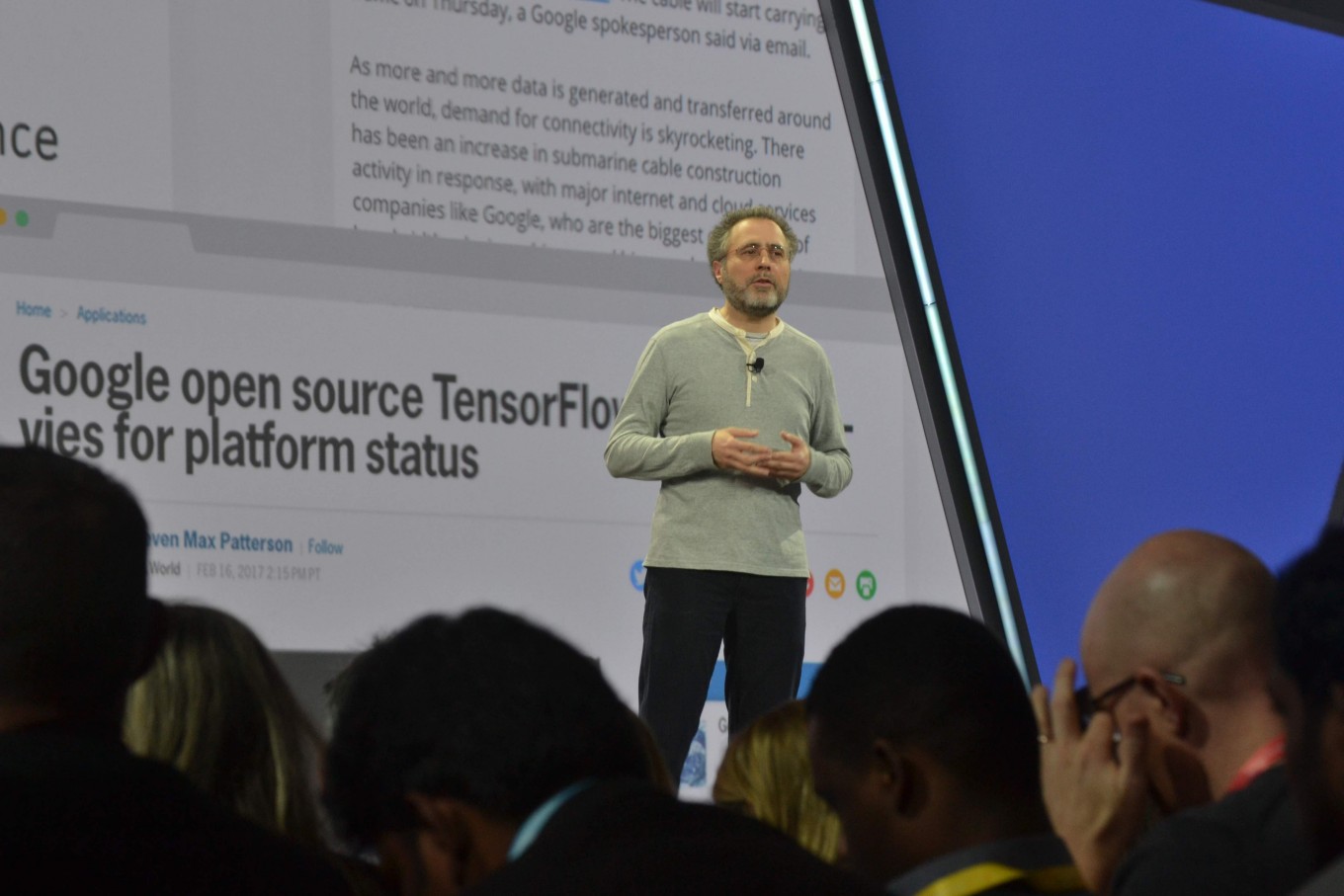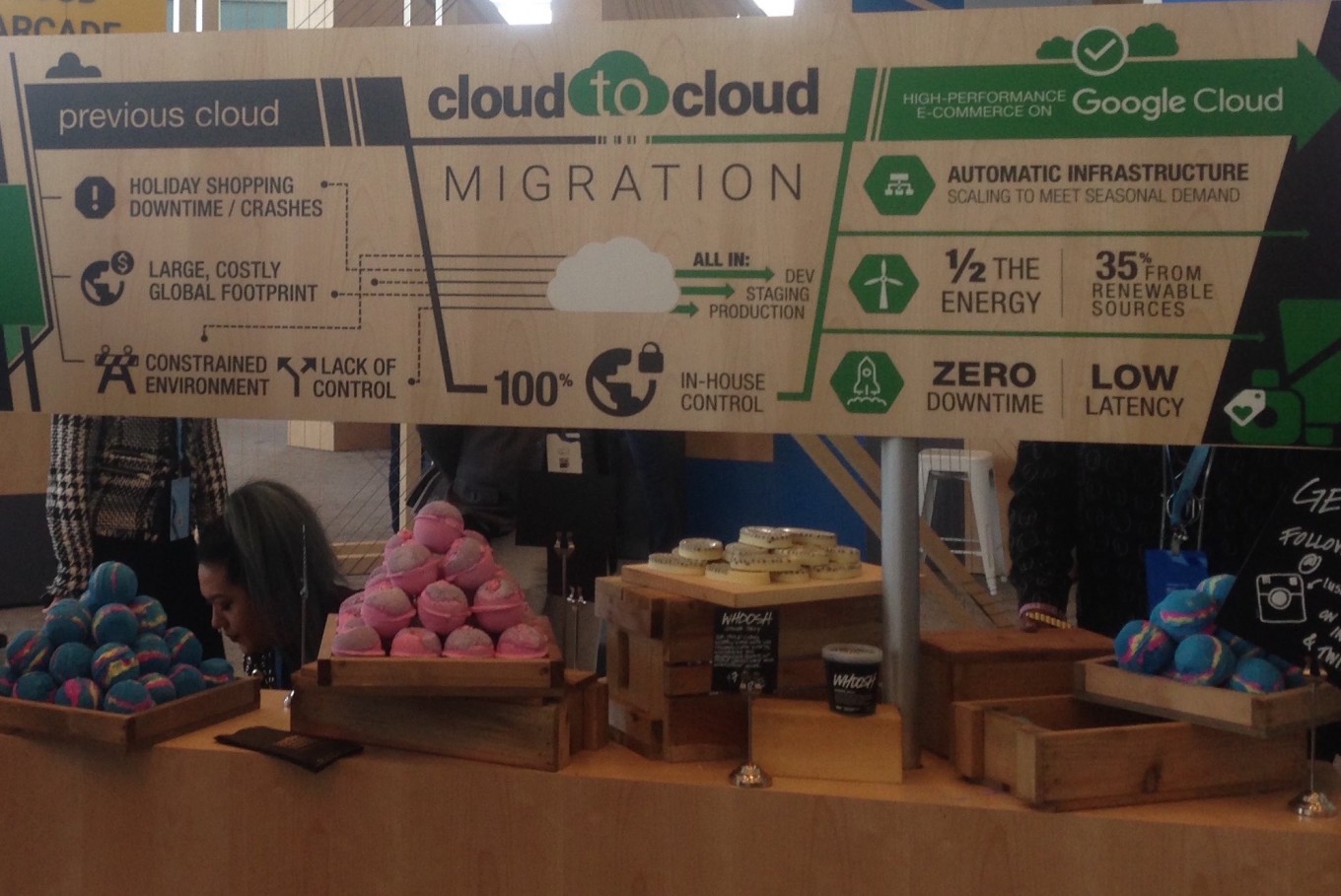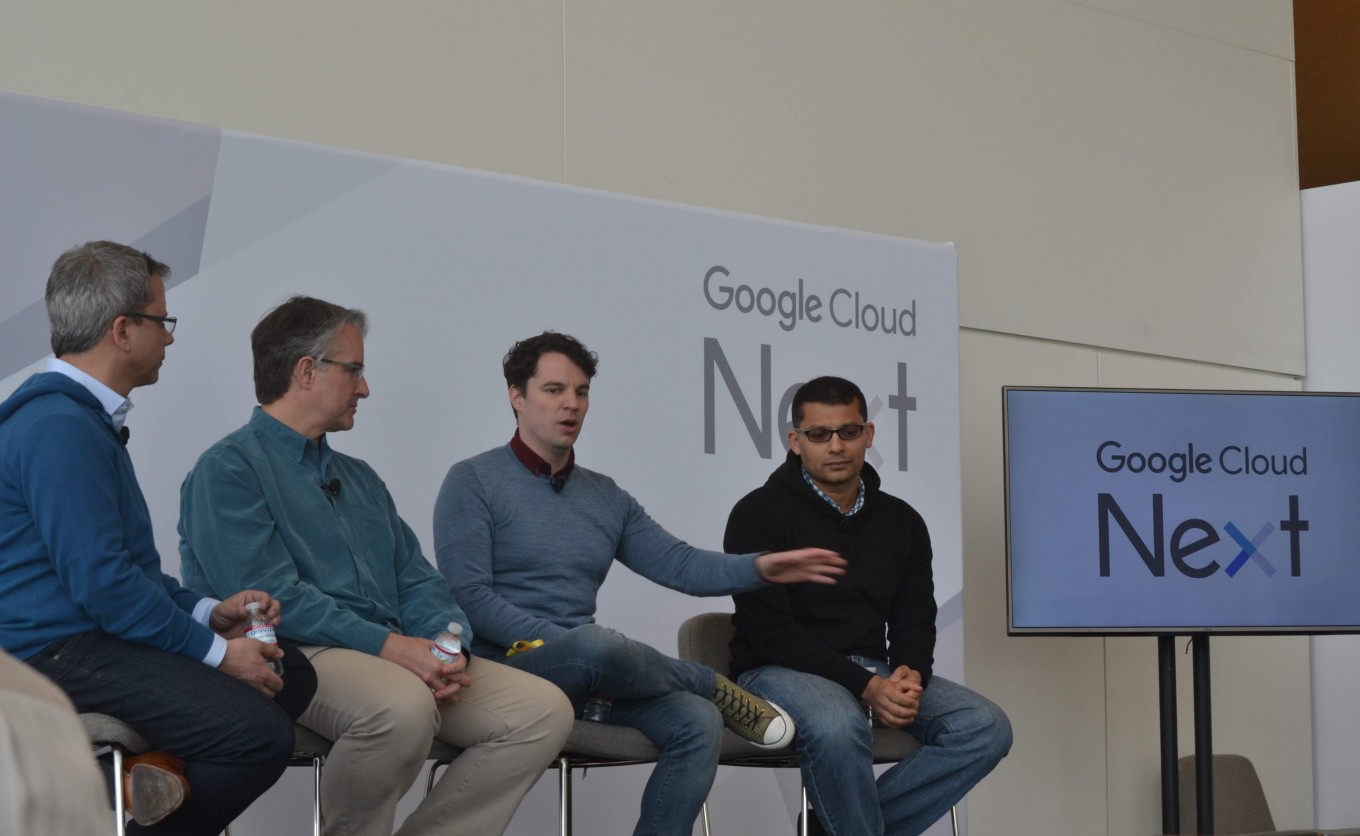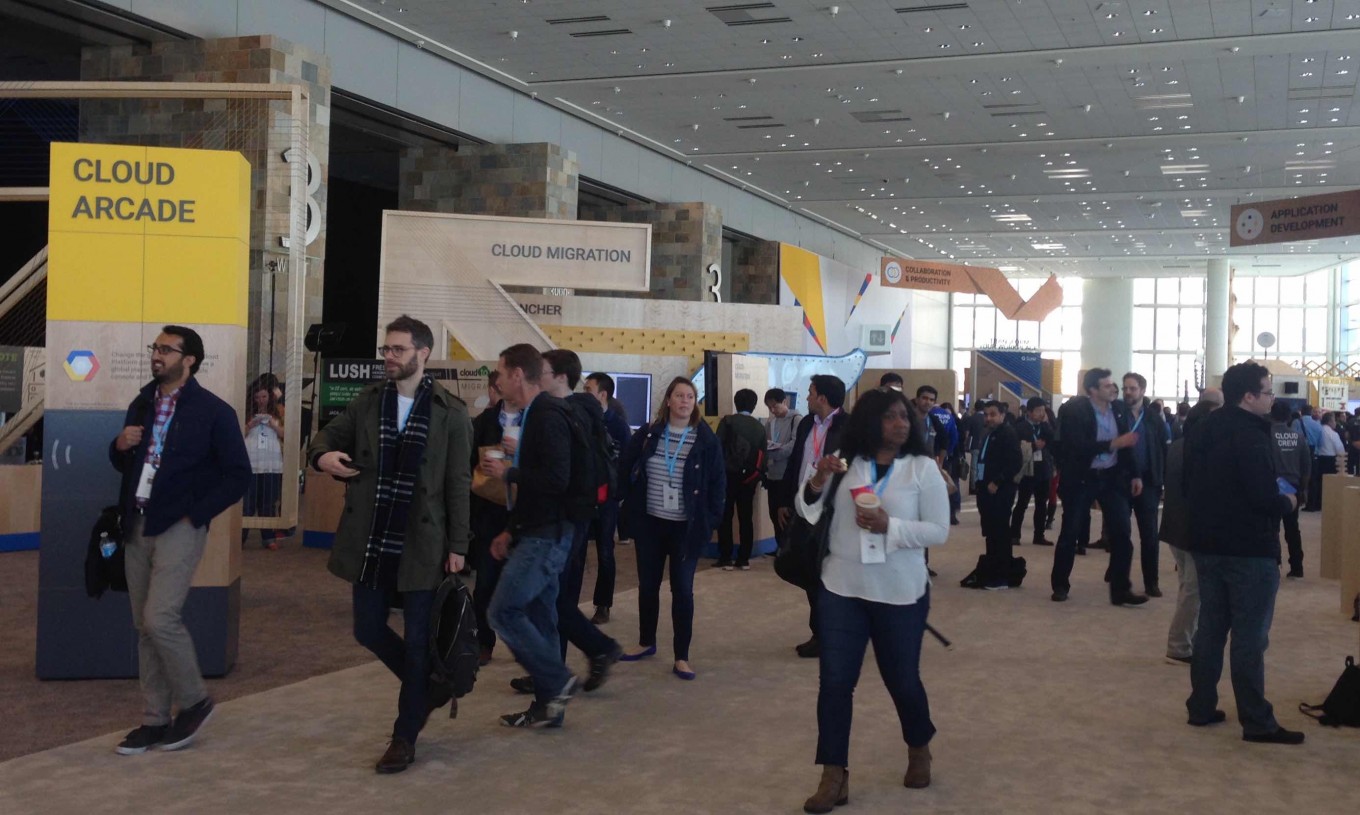Popular Reads
Top Results
Can't find what you're looking for?
View all search resultsPopular Reads
Top Results
Can't find what you're looking for?
View all search resultsGoogle Cloud entices digital-conscious firms with tech, pricing innovations
When Lush executives agreed last September to migrate their global e-commerce platform from one public cloud to another, they knew it would be a headache.
Change text size
Gift Premium Articles
to Anyone
 Geeks on cloud nine: Urs Hölzle, Google's senior vice president in charge of cloud technical infrastructure, speaks in front of thousands of participants attending the Google Cloud Next 2017 conference in San Francisco on Thursday. The Swiss software engineer, who famously designed Google's massive-yet-efficient data centers, explains how the internet search giant can support the digital transformation of enterprises through various technological and pricing innovations. (JP/Hasyim Widhiarto)
Geeks on cloud nine: Urs Hölzle, Google's senior vice president in charge of cloud technical infrastructure, speaks in front of thousands of participants attending the Google Cloud Next 2017 conference in San Francisco on Thursday. The Swiss software engineer, who famously designed Google's massive-yet-efficient data centers, explains how the internet search giant can support the digital transformation of enterprises through various technological and pricing innovations. (JP/Hasyim Widhiarto)
When Lush executives agreed last September to migrate their global e-commerce platform from one public cloud to another, they knew it would be a headache.
The British handmade cosmetics giant, famous for its unpackaged, candy-colored bath and body products, decided not to extend its contract with its previous cloud service provider and instead switched to Google Cloud as a new provider. The problem was that the data migration had to be completed by year-end, before its contract with its then-cloud provider ended.
After starting the migration on Dec. 1, Lush, which operates 17 websites and more than 900 stores worldwide, surprisingly managed to wrap up the entire process three weeks later, just days before the Christmas shopping season, the busiest trading period for the company.
“Everyone got very tense but also you achieved a lot. You actually got through it,” Lush chief digital officer Jack Constantine told thousands of participants attending the Google Cloud Next 2017 conference in San Francisco on Thursday.
The Lush story is a snapshot of the growing global demand for public cloud services such as data storage, computing and networking services. By relying on support from cloud service providers, firms can give more attention to their core operations while taking cost efficiency measures by adjusting their computing needs in response to fluctuations in demand and eliminating the need for massive investments in local infrastructure.
US-based information technology research and consulting firm Gartner, for instance, suggested that the total market of global cloud services could increase to US$322.7 billion in 2019, up by 54 percent from last year’s figure of $209.2 billion.
The attractive figure has inevitably lured many tech companies, including internet search giant Google, to intensify their focus on the business.
(Read also: Google in full gear to grab larger slice of cloud computing)
 An attendant prepares Lush's booth during the Google Cloud Next 2017 conference in San Francisco on March 9, 2017. The British cosmetics giant, famous for its unpackaged, candy-colored bath and body product, last December surprisingly managed to wrap up its data migration process to Google Cloud Platform within 22 days, just before the critical Christmas shopping season.(JP/Hasyim Widhiarto)
An attendant prepares Lush's booth during the Google Cloud Next 2017 conference in San Francisco on March 9, 2017. The British cosmetics giant, famous for its unpackaged, candy-colored bath and body product, last December surprisingly managed to wrap up its data migration process to Google Cloud Platform within 22 days, just before the critical Christmas shopping season.(JP/Hasyim Widhiarto)
Despite being a major player in the tech industry, Google did not consolidate its cloud-computing business until late 2015 when it appointed Diane Greene, the cofounder and former CEO of cloud system developer VMware, to lead its cloud division. Alphabet, Google’s parent, expects that the cloud sector will serve as an alternative source of revenue for Google, which has so far largely relied on advertising.
In 2016, Google made $10 billion from sources other than advertising, such as sales from Google Cloud, Google Play and hardware products. The figure represented only 11 percent of the company’s total sales.
Delivering an opening keynote for the three-day Google Cloud Next conference last week, Greene reiterated that, just like the Google search engine, Google Cloud Platform (GCP) was designed to run at "five nines of availability," a term used by people in the tech industry to state that something is 99.999 percent reliable.
“That’s how we design our cloud,” said Greene, who is widely respected among industry players as a queen of enterprise computing.
 Early adopters: The chief digital officer of British cosmetics giant Lush, Jack Constantine (second right), speaks during a discussion with the press on the sidelines of the Google Cloud Next 2017 conference in San Francisco on March 9, 2017, while Google’s Greg DeMichillie, the director of product management with the office of the CTO (left), the Earth imagery company Planet Labs director of engineering Troy Toman (second left), and note-taking app Evernote CTO Anirban Kundu look on.(JP/Hasyim Widhiarto)
Early adopters: The chief digital officer of British cosmetics giant Lush, Jack Constantine (second right), speaks during a discussion with the press on the sidelines of the Google Cloud Next 2017 conference in San Francisco on March 9, 2017, while Google’s Greg DeMichillie, the director of product management with the office of the CTO (left), the Earth imagery company Planet Labs director of engineering Troy Toman (second left), and note-taking app Evernote CTO Anirban Kundu look on.(JP/Hasyim Widhiarto)
Google has guaranteed its clients peace of mind on the back of massive, highly secure cloud infrastructure and thorough assistance from its dedicated engineers. During last week’s conference, the company proudly highlighted its success in assisting the public cloud migration of a number of new customers, such as Lush, note-taking app Evernote and the earth imagery company Planet Labs.
In terms of data size, Planet Labs, for example, last week completed the migration of its 7-petabyte (PB) satellite imagery archive and data pipeline processing to GCP. In comparison, that would take over 200,000 DVDs, with a capacity of 4.7 gigabytes each, to store 1 PB of data.
“We knew we didn’t want to do the typical vendor-client relationship — when the sales guy showed up once a year to renew a contract, leaves and plays golf and never sees you again,” Google’s Greg DeMichillie, the director of product management with the office of the CTO, said in a discussion with the press.
“We want a real partnership and relationship. And [we] build that into the way we work.”
Referring to estimates from Synergy Research Group, Bloomberg reported that under Greene’s leadership, Google’s share of the public cloud market has more than doubled to around 5 percent since the second quarter of 2015.
The latest data from the research group showed that Amazon Web Services (AWS) still maintained its dominant share of the public cloud services market last year, at over 40 percent. In 2015 alone, AWS pocketed almost $8 billion in revenue.
The three main chasing cloud providers — Microsoft, Google and IBM — meanwhile, have increased their worldwide market share by almost five percentage points over the last year and together now account for 23 percent of the total public cloud market.
Despite Google’s relatively new presence in the cloud business, Singapore-based Clement Teo, a principal analyst for global consulting firm Ovum, said the company had what it needed to become a partner for enterprises seeking digital transformation, including many of those in Asia.
Apart from the level of service reliability, he also highlighted that pricing strategies could be a determining factor to win competition in emerging markets.
“Most of the Southeast Asian markets are still very much price-driven and price sensitive,” he told The Jakarta Post.
 Tech enthusiasts: Google Cloud Next 2017 participants browse various booths in the conference's venue in San Francisco on Wednesday.(JP/Hasyim Widhiarto)
Tech enthusiasts: Google Cloud Next 2017 participants browse various booths in the conference's venue in San Francisco on Wednesday.(JP/Hasyim Widhiarto)
On its website, GCP offers various pricing innovations for potential clients. Customers, for example, can pick any configuration of central processing unit (CPU) and memory to save up to 50 percent compared to fixed machine types offered by its competitors. It also charges customers with per-minute billing, instead of per hour.
“If you use our VM [virtual machine] for 11 minutes, you pay for 11 minutes. GCP and only GCP, is truly an elastic cloud,” Urs Hölzle, Google's senior vice president in charge of cloud technical infrastructure, said.
While pricing can be a big deal, new members of the Google Cloud family seem to be more interested in how their new provider will guarantee long-term support to ensure the sustainability of their businesses.
“It wasn’t about price per se [but also] the business model,” Planet Labs director of engineering Troy Toman said, explaining the reason behind his company’s partnership with Google.
This article appeared earlier in The Jakarta Post's print edition on Monday under the same title.









